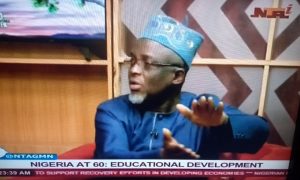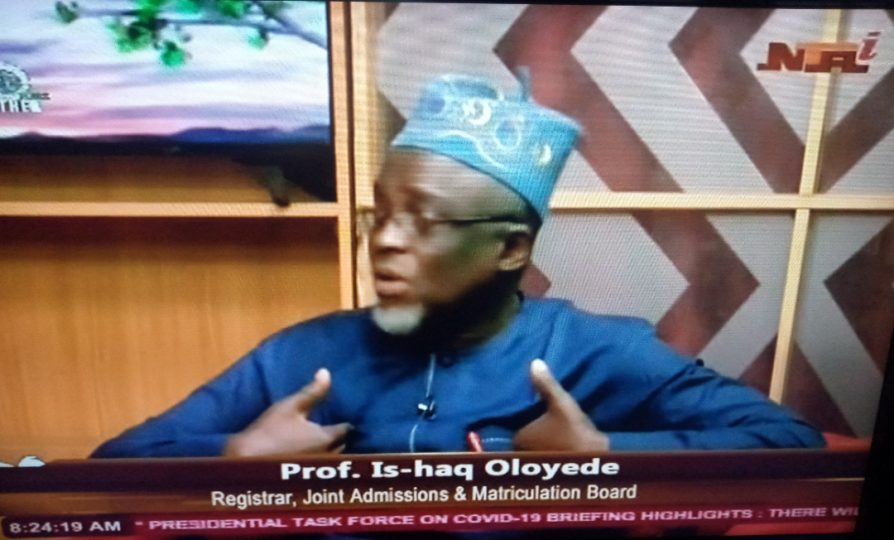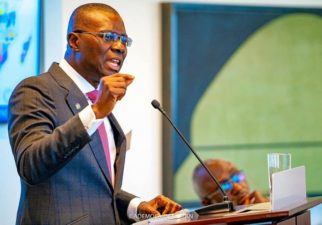*As UniBen VC, Lilian Salami, says poor funding bane of the system
*When we allow ourselves to be overwhelmed by challenges, we won’t see our efforts – Oloyede
*I’ve consulted globally, no 26% national budget for education anywhere – Okebukola
By BASHIR ADEFAKA
“But I took a class in the UK when, recently, I went as an external examiner and I asked to know those that graduated from Nigerian universities and I was given. When I took my scores and compared to the scores taken by others, I found out that those students who graduated from Nigerian universities were the ones on top in that UK university.
The Nigerian Television Authority (NTA) took a cursory look at a topic, ‘Nigeria at 60: Educational Development’, on its ‘Good Morning Nigeria’ programme, Wednesday September 30, 2020 edition.
During the programme, it featured three very important guests one of whom was seated in the main studio at the NTA headquarters Abuja, Professor Is-haq Oloyede, the Registrar/Chief Executive of Joint Admissions and Matriculations Board (JAMB) and two others, namely Professor Peter Okebukola who spoke from Abeokuta studio via Zoom and Professor Lian Salami, Vice Chancellor, University of Benin, who equally spoke from Benin studio via Zoom.
Opening the discourse, Professor Okebukola noted that the idea that one’s father’s farm is the worst or best can only be when one is not exposed to other people’s farms as far as educational development is concerned, adding that when one sees the state of others, he will better appreciate what he has.

Professor Is-haq Oloyede, JAMB Registrar.
“I have seen other farms in the whole of Africa in terms of education, and I can tell you that we are doing better in Nigeria. Can you tell me they don’t have bad educational system in the United States of America or that they don’t have bad teachers? I am not saying that we are there yet but we are still doing better in Nigeria.
“If we say we are not doing well in Nigeria, why do Americans come to look for our doctors, nurses, engineers and all of that?” Professor Okebukola said.

From Left: Professor Okebukola, Professor Lilian Salami and Professor Is-haq Oloyede.
In her own view, University of Benin Vice Chancellor, Professor Lilian Salami, said, “We may have good policies but driving them is the problem. Poor funding is still the problem also. In those days education was quality because there was the money. But now we have the population but we do not have money to” take care of the challenges. The problem is infrastructural decay, lack of motivations for students and teachers. We still are doing our best but we have not done what we ought to do.”
Professor Is-haq Oloyede, JAMB Registrar, bemoaned a situation where, in Nigeria, people still do what they hitherto complained against being done by some other people – lack of planning for the future. He said most of the problems that people lament over are caused by just lack of planning for the future right from the present and so, which is the reason problems at hand – most often time – seem to be much more overburdening that the strength to get out of the problems is elusive.
He was however disinclined to Professor Salami’s position about poor funding as reason for the complaints all around.
Oloyede said, “The problems are so overwhelming that we cannot see the proceeds. When I was President of African Universities, I had the privilege to travel across Africa at least among universities in the world and I was able to appreciate Nigeria. I agree with my sister Professor Salami about poor funding but we need to be innovative.”
The JAMB Registrar, eulogized on the programme by Professor Okebukola as globally recognized administrator particularly for his bringing the blind and other less-privileged to being able to write JAMB, gave example of how he practically impacted the educational system during his days growing from student to becoming Vice Chancellor of the University of Ilorin.
As students of University of Ilorin he said he knew what students used to have of benefits and all others but then, that things unfortunately later went bad.
“The day I was announced as Vice Chancellor of University of Ilorin, the first thing that came on my mind was to restore the university to what it was when I was a student. I was not planning to make it better but at least to make it as good as it used to be when I was student.
“But I took a class in the UK when, recently, I went as an external examiner and I asked to know those that graduated from Nigerian universities and I was given. When I took my scores and compared to the scores taken by others, I found out that those students who graduated from Nigerian universities were the ones on top in that UK university.
“Even a student that I taught in Nigeria, who was not on top in my class ad not in the A class, was among those on top in the UK university exams. So, what this means is that we are doing well in our educational system here in Nigeria, poor funding or not.
“But if we allow ourselves to be overwhelmed by the fact that we have challenges, we will not see the efforts being made,” he said.
At his own turn during the discussion, Professor Okebukola, corroborating Oloyede, said as education consultant across the world, he finds out that the 26 percent national budget it not anywhere but only in the Nigerian literature.
He insisted that poor funding, much as it is necessary factor, should not be reason for Nigeria not to see the great efforts being made in itself.
Professor Okebukola, however, said poor remuneration of teachers particularly in private universities isn’t brilliant.
“When you pay a lecturer, for instance, N25,000 per month, how do you expect him to bring out his best?”
When the turn came back to Oloyede, he said, “I’m worried myself especially when we talk about ourselves. We create problems for ourselves and we complain about the problems that we created. It is difficult for anybody to believe that there is no 26 percent of national budget anywhere. So, we created imaginary situation” and, he added, in the end it becomes a problem that people begin to cry over.
“Yes, we have problems but there are more self created problems than we talk about,” Oloyede said believing, for instance, that JAMB, NECO, others should not be liabilities to the country talking about how to share education budget.
To him, they should not be part of the problems but they should be part of the solutions.
Professor Okebukola insisted that Nigerians should stop lamenting over their problems but count more and more of their blessings as it will be part of the solutions to do be alerted with the fact that they are not about failures and bad all the times but about good and successes.
In his rounding off time, Professor Oloyede believes that the discrepancy between remuneration of workers of government establishments should be removed in the spirit of fairness.




